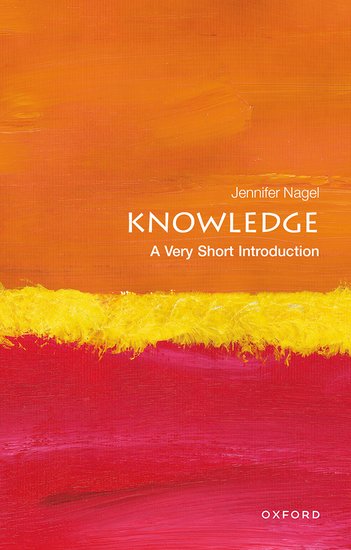Home >
A Very Short Introduction >
Knowledge (Philosophy)
A Very Short Introduction | Philosophy
Knowledge
ISBN: 9780199661268
Series: A Very Short Introduction
Knowledge (Philosophy)
A Very Short Introduction Knowledge (Philosophy) Media > Books > Non-Fiction > Education Books Expect Delays of Up to 4 Weeks| Order Below |
ISBN
9780199661268 (10-digit ISBN: 019966126X)
- Description
- Key Features
- Series Description
- Table of Contents
- Includes both historical and contemporary developments in the theory of knowledge
- Expresses complex ideas in a clear and accessible way, using simple examples
- Examines the relationship between knowledge and truth
- Explores the central issues and debates in epistemology
What is knowledge? How does it differ from mere belief? Do you need to be able to justify a claim in order to count as knowing it? How can we know that the outer world is real and not a dream?Questions like these are ancient ones, and the branch of philosophy dedicated to answering them - epistemology - has been active for thousands of years. In this thought-provoking Very Short Introduction, Jennifer Nagel considers these classic questions alongside new puzzles arising from recent discoveries about humanity, language, and the mind. Nagel explains the formation of major historical theories of knowledge, and shows how contemporary philosophers have developed new ways of understanding knowledge, using ideas from logic, linguistics, and psychology. Covering topics ranging from relativism and the problem of scepticism to the trustworthiness of internet sources, Nagel examines how progress has been made in understanding knowledge, using everyday examples to explain the key issues and debates.
REVIEWS:"I am in love with this series - it's like having an extended course of study in one's rucksack or handbag that's designed to educate the modern polymath." - GrrlScientist, Guardian Books"[A]dmirably clear and engaging" - Steven Poole, The Guardian
Oxford's Very Short Introductions series offers concise and original introductions to a wide range of subjects--from Islam to Sociology, Politics to Classics, Literary Theory to History, and Archaeology to the Bible.
Not simply a textbook of definitions, each volume in this series provides trenchant and provocative--yet always balanced and complete--discussions of the central issues in a given discipline or field. Every Very Short Introduction gives a readable evolution of the subject in question, demonstrating how the subject has developed and how it has influenced society. Eventually, the series will encompass every major academic discipline, offering all students an accessible and abundant reference library.
Whatever the area of study that one deems important or appealing, whatever the topic that fascinates the general reader, the Very Short Introductions series has a handy and affordable guide that will likely prove indispensable.
Please note: As this series is not ELT material, these titles are not subject to discount.
1: Introduction
2: Scepticism
3: Rationalism and empiricism
4: The analysis of knowledge
5: Internalism and externalism
6: Testimony
7: Shifting standards?
8: Knowing about knowing
Further reading
Index
What is knowledge? How does it differ from mere belief? Do you need to be able to justify a claim in order to count as knowing it? How can we know that the outer world is real and not a dream?Questions like these are ancient ones, and the branch of philosophy dedicated to answering them - epistemology - has been active for thousands of years. In this thought-provoking Very Short Introduction, Jennifer Nagel considers these classic questions alongside new puzzles arising from recent discoveries about humanity, language, and the mind. Nagel explains the formation of major historical theories of knowledge, and shows how contemporary philosophers have developed new ways of understanding knowledge, using ideas from logic, linguistics, and psychology. Covering topics ranging from relativism and the problem of scepticism to the trustworthiness of internet sources, Nagel examines how progress has been made in understanding knowledge, using everyday examples to explain the key issues and debates.
REVIEWS:"I am in love with this series - it's like having an extended course of study in one's rucksack or handbag that's designed to educate the modern polymath." - GrrlScientist, Guardian Books"[A]dmirably clear and engaging" - Steven Poole, The Guardian
Key Features
- Includes both historical and contemporary developments in the theory of knowledge
- Expresses complex ideas in a clear and accessible way, using simple examples
- Examines the relationship between knowledge and truth
- Explores the central issues and debates in epistemology
Series Description
Oxford's Very Short Introductions series offers concise and original introductions to a wide range of subjects--from Islam to Sociology, Politics to Classics, Literary Theory to History, and Archaeology to the Bible.
Not simply a textbook of definitions, each volume in this series provides trenchant and provocative--yet always balanced and complete--discussions of the central issues in a given discipline or field. Every Very Short Introduction gives a readable evolution of the subject in question, demonstrating how the subject has developed and how it has influenced society. Eventually, the series will encompass every major academic discipline, offering all students an accessible and abundant reference library.
Whatever the area of study that one deems important or appealing, whatever the topic that fascinates the general reader, the Very Short Introductions series has a handy and affordable guide that will likely prove indispensable.
Please note: As this series is not ELT material, these titles are not subject to discount.
EASY ORDER FORM
PRICES LISTED INCLUDE CONSUMPTION TAX
Price Before Tax:
¥1,790


